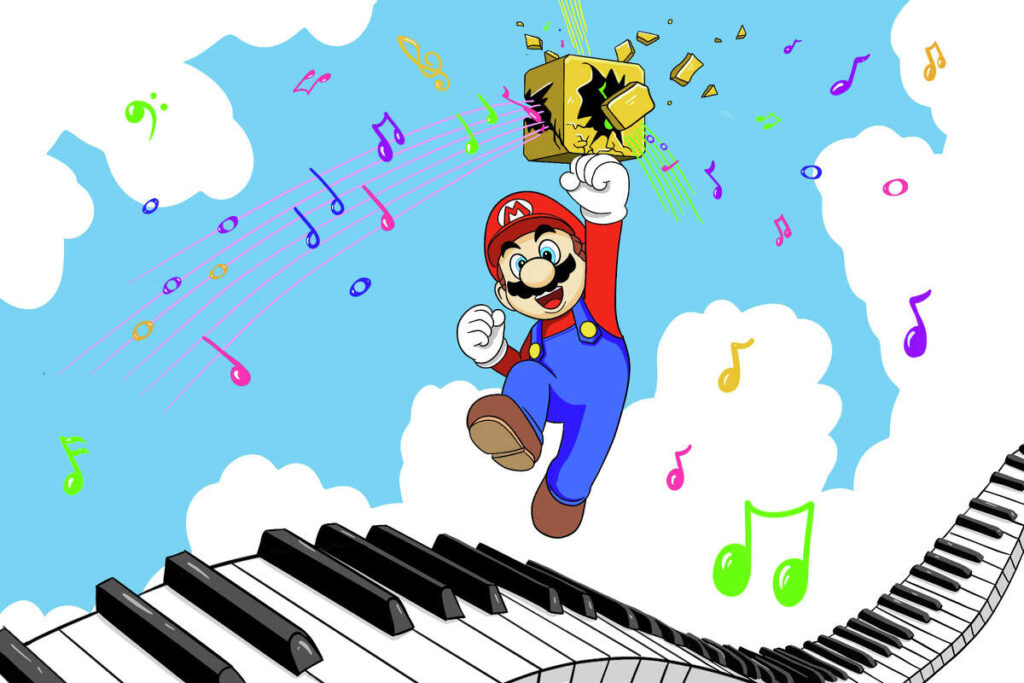
By: Kristina Ferry
I have always loved video games. I have played them most of my life, and I cannot remember a time when I did not have a handheld console or controller in my hand. As you can see, my family has gathered a collection of video games, and these are just the ones we have on the Nintendo Wii. I have not played all these, but I have played most of them or watched my other family members play them. As a family, we have accumulated so many different consoles that it would be difficult to name them all, but for a short run down we have numerous Nintendo and PlayStation consoles, along with handheld consoles like the Nintendo DS and the Nintendo 3-DS. With all these consoles and around 200 video games in total, I have seen a diversity of games and gaming music. Most of the days I remember studying or doing homework at an early age include hearing Mario or Sonic music in the background. By using video game soundtracks that I find on YouTube to help me focus, I have excelled when it comes to studying.
Listening to music while you study is not a new idea, and the benefits have been proven in various experiments. Dr. Kiss and Dr. Linnell from the Department of Psychology at Goldsmiths University in London say, “Music has been shown to positively affect spatial processing and spatial reasoning.” One experiment that supported this claim was an experiment in which a group of office workers was assigned to listen to music during their workday to see if it improved their quality of work and their ability to focus. Dr. Haake from the Department of Music at the University of Sheffield conducted this experiment and said, “Music helped them to both engage in and escape from work, and they often used music to seal themselves off from the office environment.”
With this evidence of why music is generally beneficial, the question must be asked as to why video game music can be particularly helpful for concentration. For most video games, the music that plays in the background is instrumental, meaning that there are no lyrics. This is important to remember since other studies have shown that listening to music with lyrics while trying to do tasks like reading and writing can be difficult.
A benefit that video game music has over regular instrumentals is that the purpose of the music in the background of these games is to make you focus. As Tim Brooks, a media historian, said, “Whether you’re engaging in battle or just moving from point A to point B, your actions are usually accompanied by music … This music is often designed to motivate without being distracting. It’s ultimately designed to help focus you on the task at hand.” This makes sense since many games have you solving puzzles or defeating enemies, which requires a great deal of concentration on the player’s part. As Shaunacy Ferro, a journalist who studied urban culture, put it, “Basically, successful video game music straddles the balance between being engaging and exciting, but also not wanting to make you tear your ears off after the 10th or 100th listen.”
With these examples and some data from my past, I have compiled three specific kinds of video game music that have been found beneficial to help people focus.

Rune Factory Frontier – YouTube The first type of music is the more natural or rural-sounding songs often found in farming simulators like Rune Factory Frontier, Stardew Valley, and – to an extent – Minecraft. While not the most exciting music, this kind of music is great to sit down and listen to when you are trying to create a peaceful atmosphere and do not want a sound that demands a lot of your attention. This type of music or softer, more lullaby-sounding ones are ideal for a midday study but not too late at night, or you may go to sleep unintentionally. I know from personal experience.

Wii Channel Music – Mario Kart Wii A second type of music that is popular is racing or hurrying-sound music, which can often be found in games such as Mario Kart or Mario Party. The soundtracks to these games have been engineered to keep your attention as you are racing to the finish line or stressing out over a difficult minigame. With the amount of time that is usually put into creating these soundtracks, even just hearing the music can give you a sense of urgency and already make your brain calculate decisions at a faster level. While not quite as relaxing, this music can provide a nice sense of urgency or perhaps even fun to the task at hand, helping to complete it in a quicker time.

FE Three Houses OST – 1. Three Houses Main Theme (English) A final type of video game music is battle or combat-heavy music, which can be found in games such as Fire Emblem: Three Houses or Pokémon. While not the style I prefer, my brother, also a gamer, says this type of music helps him concentrate the best. Because he has spent countless hours staring at battle screens trying to figure out what his next move should be or what character should attack who, his brain has become accustomed to using that sound to help him focus. While this works for him, many individuals find that they may struggle with this kind of music as it can be distracting or more stressful than it is helpful.
While every person is different and has their own preferred musical styles, science has proven that these types of tracks are the best at getting your brain to focus and use the music it hears to its advantage rather than at a disadvantage.
